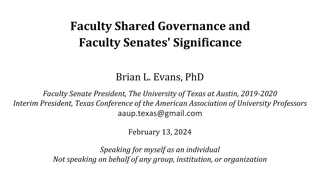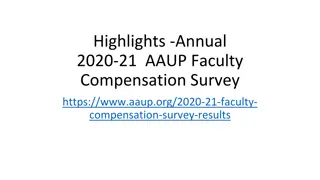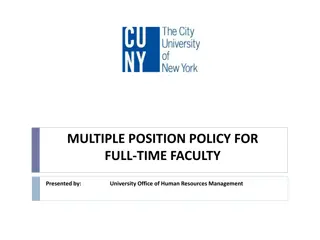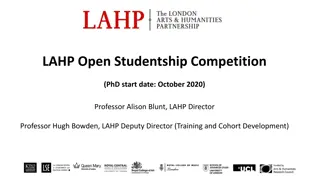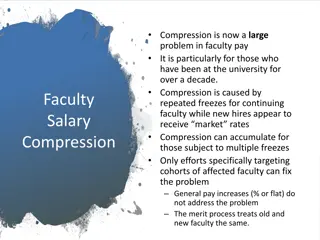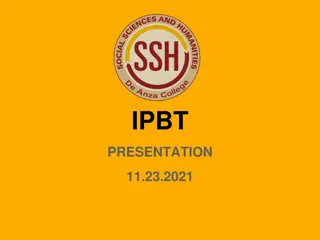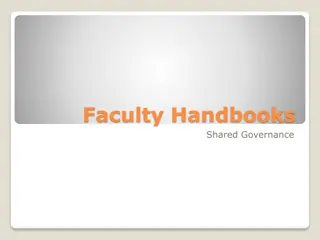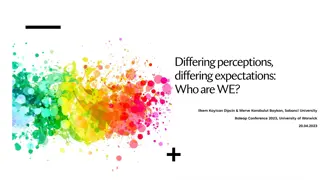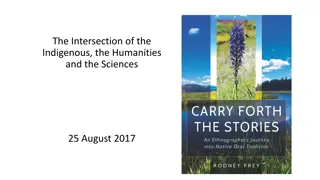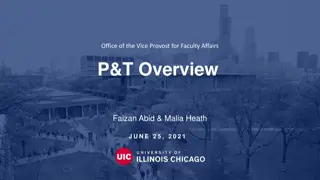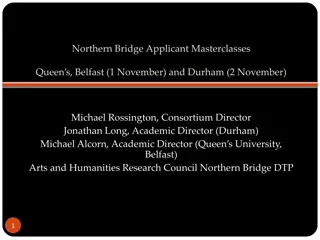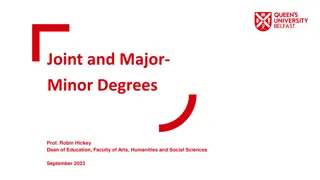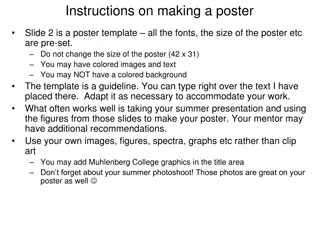Overview of the Faculty of Humanities at Rhodes University
Explore the Faculty of Humanities at Rhodes University, led by the Dean Professor Enocent Msindo, and learn about the role of the Dean, the structure of the Deanery, the study of Humanities, degrees offered, and undergraduate degree requirements in various disciplines such as Anthropology, Economics, Journalism, and more.
Download Presentation

Please find below an Image/Link to download the presentation.
The content on the website is provided AS IS for your information and personal use only. It may not be sold, licensed, or shared on other websites without obtaining consent from the author.If you encounter any issues during the download, it is possible that the publisher has removed the file from their server.
You are allowed to download the files provided on this website for personal or commercial use, subject to the condition that they are used lawfully. All files are the property of their respective owners.
The content on the website is provided AS IS for your information and personal use only. It may not be sold, licensed, or shared on other websites without obtaining consent from the author.
E N D
Presentation Transcript
Welcome to the Welcome to the Faculty of Humanities, Faculty of Humanities, Rhodes University Rhodes University Faculty of Humanities, Randell House, 1 Prince Alfred Street
The Role of the Dean The Role of the Dean Leadership and strategy development at the Faculty level Guide students in their studies Approve courses and degrees Award degrees Congratulate students on good performance Warn students of bad performance Exclude students from the Faculty and University for continual bad performance
The Deanery The Deanery The Dean: Professor Enocent Msindo Assisted by: 2 Deputy Deans: Professor Patrice Mwepu (Research) Professor Maureen De Jager (Teaching & Learning) A Faculty Officer: Ms Karen Kouari
Current Size and Shape: Faculties Current Size and Shape: Faculties
What are the Humanities? What are the Humanities ? Studies to do with humans and: How they think and what they think about How they behave and live together How they communicate (language, literature, art, drama, dance, music, etc.) Their past and their future
Degrees and Subjects Degrees and Subjects To qualify for a Humanities degree, 50% of the subjects chosen, including a minimum of ONE major subject obtained at NQF Level 7 MUST be from Humanities departments/ schools (Legal Theory can count as a Humanities subject).
Undergraduate Degrees Undergraduate Degrees Degree Minimum Duration BA BA 3 or 4 Year Degree Subjects Must major in a minimum of ONE Humanities subject and have 50% of the degree made up of Humanities subjects Must major in at least one of: Anthropology, Economics, Journalism and Media Studies, Politics, Psychology or Sociology, taking into account the 50% Humanities subjects rule BSocSci BSocSci 3 or 4 Year Degree In addition, must have at least 2 other subjects from this subject group Compulsory Art Subjects with Humanities subjects Compulsory Music Subjects with Humanities subjects Compulsory Journalism and Media Studies + isiXhosa for Journalism with other subjects BFA BFA 4 Year Degree BMus BMus 4 Year Degree BJourn BJourn 4 Year Degree
Subject Departments and Schools Subject Departments and Schools 2 SCHOOLS 2 SCHOOLS: : 11 DEPARTMENTS 11 DEPARTMENTS: : SCHOOL OF JOURNALISM & MEDIA STUDIES ANTHROPOLOGY DRAMA LITERARY STUDIES IN ENGLISH FINE ART HISTORY LINGUISTICS AND APPLIED LANGUAGE STUDIES MUSIC PHILOSOPHY POLITICAL AND INTERNATIONAL STUDIE PSYCHOLOGY SOCIOLOGY SCHOOL OF LANGUAGES AND LITERATURES offers: African Language Studies Afrikaans Chinese Classical Studies French German Greek Latin
3 3- -year BA / year BA / BSocSci NQF Level 7 = NQF 360 credits NQF Level 7 = NQF 360 credits BSocSci A1 + B1 + C1 + D1 A1 + B1 + C1 + D1 Year Year 1 1 A2 + B2 + D2 + E1 A2 + B2 + D2 + E1 Year Year 2 2 B3 + D3 B3 + D3 Year Year 3 3
4 4- -year BA / year BA / BSocSci NQF Level 7 = NQF 360 Credits NQF Level 7 = NQF 360 Credits BSocSci Degree Degree A1 + B1 + C1 A1 + B1 + C1 Year Year 1 1 A2 + B2 + D1 A2 + B2 + D1 Year Year 2 2 A3 + D2 A3 + D2 Year Year 3 3 B3 + D3 B3 + D3 Year Year 4 4
4 4- -year year BJourn NQF Level 8 = NQF 480 Credits NQF Level 8 = NQF 480 Credits BJourn Degree Degree JMS1 + A1 + B1 + C1 JMS1 + A1 + B1 + C1 Year Year 1 1 JMS2 + A2 + B2 + XHS JRN JMS2 + A2 + B2 + XHS JRN Year Year 2 2 JMS3 + B3 JMS3 + B3 Year Year 3 3 JMS4 JMS4 Year Year 4 4
4 4- -year BFA Degree year BFA Degree NQF Level 8 = NQF 480 Credits NQF Level 8 = NQF 480 Credits FAP1A + FAP1B + AHV1 + X1 FAP1A + FAP1B + AHV1 + X1 Year Year 1 1 FAP2A + FAP2B + AHV2 + X2 or Y1 FAP2A + FAP2B + AHV2 + X2 or Y1 Year Year 2 2 FAP3 + AHV3 FAP3 + AHV3 Year Year 3 3 FAP4 + AHV4 FAP4 + AHV4 Year Year 4 4
4 4- -year BMus Degree year BMus Degree NQF Level 8 = NQF 480 Credits NQF Level 8 = NQF 480 Credits IMS1 + MTA1 + MCH1 + ST1 or X1 IMS1 + MTA1 + MCH1 + ST1 or X1 Year Year 1 1 IMS2 + MTA2 + MCH2 + ST2 or IMS2 + MTA2 + MCH2 + ST2 or X2/Y1 X2/Y1 Year Year 2 2 IMS3 + MUS3 or MCH3 IMS3 + MUS3 or MCH3 Year Year 3 3 MUS4 MUS4 Year Year 4 4
Degrees can take longer than 3 Degrees can take longer than 3 or 4 years due to: or 4 years due to: Changes in subject choices (particularly majors) Through failing credits. A degree WILL take an extra year if a student fails to pass: At least 3 credits in their first year of study At least 7 credits by the end of their 2nd year of study 2 (or 3) credits in their 3rd year of study
Education is not a Commodity Education is not a Commodity It is not a matter of paying fees one end and picking up a degree at the other Rich partnership between student and academic departments that sustains learning and leads to the well-earned award of a degree Much work to be done by both the student and the lecturer to create the degree
Our Aim Our Aim We aim to develop graduates with an emphasis on education, rather than vocation Our graduates are people who are: creative critical thinkers compassionate clear communicators have a capacity for life-long learning
Assumptions we make about our Assumptions we make about our students students Want to be at Rhodes University Want to learn Want to cooperate with peers and staff Want to perform at their best Want to take responsibility for their studies Want to ask questions Want to be proactive Want to work independently
Words of advice to Students Words of advice to Students Structure your time: Structure your time: academic (lectures, assignments, projects, assessments) Sport, exercise, hobbies social and entertainment Develop patterns of behaviour: Develop patterns of behaviour: get up, eat, attend ALL study, exercise/socialise, sleep listen/look/experience, question, clarify, argue, understand, write down, file, review ALL lectures and tutorials,
When Things Go Wrong? When Things Go Wrong? Don t panic Don t panic, and certainly don t hide. Go and talk to: Tutor, Lecturer, Course Co-ordinator, Head of Department, Dean, Faculty Officer Sub-warden, warden Counselling Centre (variety of services, such as study skills, career advice, psychological counselling)
If you have any questions, please e-mail humanities@ru.ac.za Thank you.


